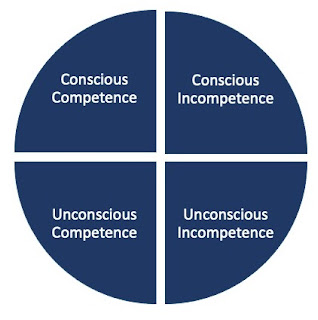One of the most useful models I’ve found for discussing coaching techniques used in the FTO Development Course has been the Conscious Competence Model. The model labels the development level of a learner, describes their characteristics at that level and provides the trainer with the methodology to move the learner to the next stage. The model can apply to the totality of the job, like police work, or learning one task, like body searches. The origins of the model are shrouded in the mists of time, but the article linked at the end of this blog runs through some of the possibilities.
As taught in the FTO class, the development levels are:
· Unconscious Incompetence. The learner does not know what knowledge, skills, or attitudes are needed to successfully complete a task or apply a concept. They may think they do because they watch TV, but they don’t. The trainer’s role is to provide an experience to illustrate what is involved. That may be a video, a story, a scenario or, as in an FTO program, a couple of days on the job. This should lead to…
· Conscious Incompetence. Now they know that they don’t know enough. The experience serves to motivate the student or trainee to put in the effort to learn what they don’t know. Learning takes us out of our comfort zone, so we need to be motivated to persevere. At this level, the student needs encouragement, and a lot of input from the trainer. To be able to move to the next stage, they will have to practice in a simplified, and standardized, context to gain confidence in the skill or concept being taught. Initial practice can be discouraging and embarrassing so the trainer needs to be supportive and patient. Depending on the task, enough practice will lead to…
· Conscious Competence: With enough targeted practice, the trainee or student can now perform the whole task but not at the speed they’ve seen the trainer do it because they are still thinking through each step. This in itself is discouraging so the trainer needs to be standing by to offer support but much less input. There are few things more irritating that trying to reason something out for yourself and some smarty pants jumps in to tell you how to do it. So, the trainer’s role is to provide enough repetitions in training to build fluidity and enough variations to encompass the realistic application to the job. Note that this is the place for variation, not in the previous stage. With repetitions comes…
· Unconscious Competence: At this stage, the learner can do the task or apply the concepts fluidly and at speed, without consciously considering each step. In most jobs, there will still be decision points where we are consciously prioritizing the information presented to us but for the most part we can confidently move through those decisions. The trainer’s role is minimal in this stage. Because of the feedback given during the repetitions, the trainee or student knows they have done the task correctly and well. The trainer should stand by for next level questions or tactics.
There is more to know about this model, but you’ll have to go to the FTO class to hear it. Right now, I want to talk about the fifth level of competence, Reflective Competence. That is the level the trainer must be at to be effective.
In order to teach something that you are unconsciously competent at, you need to step back and think about how you learned the task. Did someone coach you? Did you have a job aid to refer to? Was it trial and error? Did you have many repetitions in a short time to build a habit? Did you practice on your own because your trainer thought you should have gotten it the first time it was explained?
How long did it take to learn? How did it feel to risk being wrong? When did you become confident in your skill? Did you ever experience a variation that threw you? What accelerated your development? What slowed it down?
It takes self-awareness to be honest about these questions. Have a chat with your first FTO or supervisor. If you’re allowed to, read your own DORs or early evaluations. The purpose is to regain a beginner’s mind. To remember what comes first, what is hard, what the common mistakes are, what seemed unimportant in the beginning, but you now know is essential for success down the line.
As a trainer or someone who is designing training, your job is not to show off how much you know or how well you can do a task. There is value in providing a model of good performance, but your primary goal is to help your students achieve competence, not dazzle them with your ability. Your challenge is to sequence the experiences, practice, repetitions, and feedback so that the learner develops smoothly and confidently. Excellent instructors don’t just know their subject, they care about the success of their students.
Janet
For more information, check out this article: https://www.businessballs.com/self-awareness/conscious-competence-learning-model/.
For a short blog on being an expert: https://theelearningcoach.com/learning/the-experts-brain/

